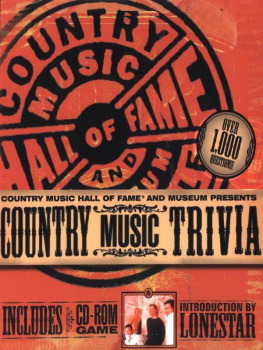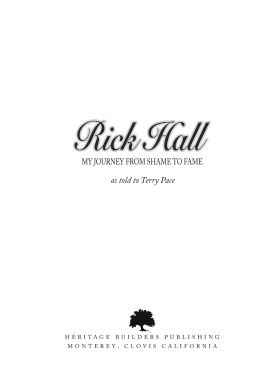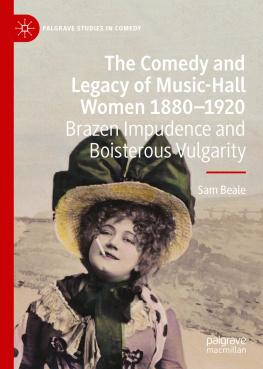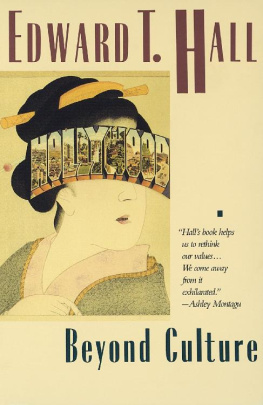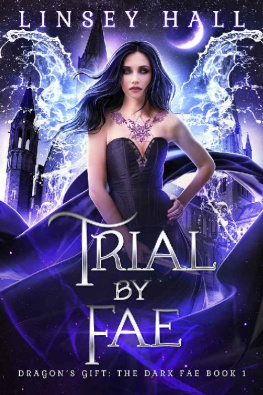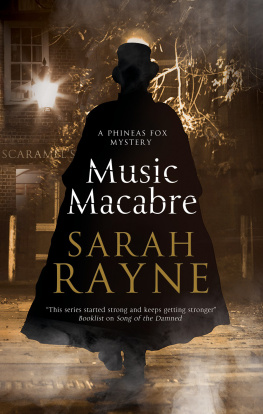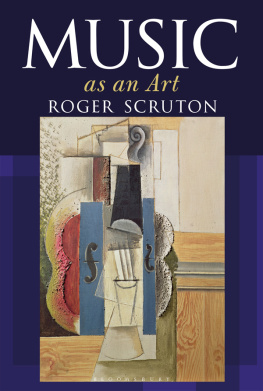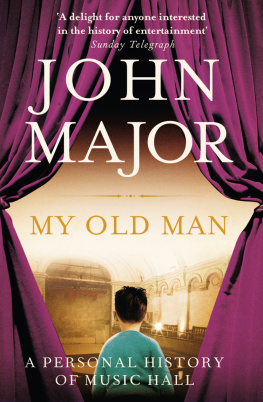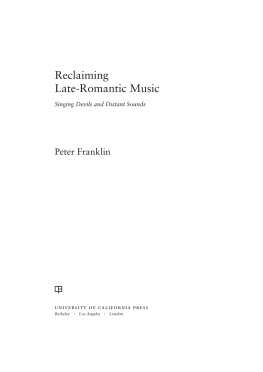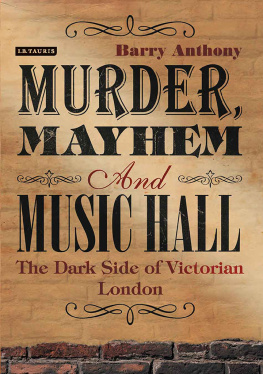MUSIC HALL AND MODERNITY
MUSIC HALL &
MODERNITY
The Late-Victorian Discovery of Popular Culture
Barry J. Faulk
Ohio University Press, Athens, Ohio 45701
2004 by Barry J. Faulk
Printed in the United States of America
All rights reserved
Ohio University Press books are printed on acid-free paper

First paperback edition 2014
HARDCOVER 12 11 10 09 08 07 06 05 04 5 4 3 2 1
PAPERBACK 22 21 20 19 18 17 16 15 14 5 4 3 2 1
Library of Congress Cataloging-in-Publication Data
Faulk, Barry J.
Music hall and modernity : the late-Victorian discovery of popular culture / Barry J. Faulk.
p. cm.
Includes bibliographical references and index.
ISBN 0-8214-1585-9 (cloth : alk. paper)
1. English literature19th centuryHistory and criticism. 2. Music-halls (Variety-theaters, cabarets, etc.) in literature. 3. Music-halls (Variety-theaters, cabarets, etc.)EnglandLondonHistory19th century. 4. English literatureEnglandLondonHistory and criticism. 5. Performing artsEnglandLondonHistory19th century. 6. Popular cultureEnglandLondonHistory19th century. 7. London (England)Intellectual life19th century. 8. London (England)In literature. 9. Performing arts in literature. 10. Popular culture in literature. I. Title.
PR468.M86F38 2004
820.9'357dc22
2004008199
To Moscovia and Richard
Contents
Illustrations
Acknowledgments
It is a great pleasure to acknowledge those who supported me in the process of writing this book, and who made it possible for me to complete it. I am indebted to Patrick Scott for introducing me to the study of Victorian popular culture, and to James Hipp and Marc Demarest for their support and friendship. This project began in earnest at the University of Illinois at Urbana-Champaign, where I was fortunate enough to have world-class mentors: Amanda Anderson, Michael Brub, Peter Garrett, and Dale Kramer. At that time, cultural studies had emerged as a force to be reckoned with in the American academy. This book is tied to that moment: it owes a great deal to the work of the visiting scholars I was fortunate enough to witness during my time at Illinois. I am indebted to Peter Garrett, Lawrence Grossberg, Cary Nelson, and Paula Treichler for promoting cultural studies research at the University of Illinois through the Unit for Criticism and Interpretive Theory. I was also lucky in having generous, brilliant, and caring peers: these are too numerous to mention, but the members of my dissertation writing groupStacy Alaimo, Rick Canning, Brady Harrison, Lauren Onkeydeserve special mention for all they taught me. Robert Steltman generously shared his expertise in popular culture with me. Michael Thurston furnished me with a model of the engaged scholar: I learned a lot from him, and still do. I encountered David Chinitzs work on T. S. Eliot and popular culture at this point in my career; I am grateful that he remains a careful, insightful reader of my work. And although great cultural studies scholarship was happening all around me, Im not certain that I would ever have linked it to Victorian studies if Amy Farmer hadnt encouraged me to make that connection. Thanks, Amy.
I am grateful for the institutional support provided by Florida State University during the writing of this book, especially for the boon of a research semester, provided by our dean, Donald J. Foss. The English Department at Florida State has made me feel welcome since I arrived, and I am deeply indebted for all that our department chair, Hunt Hawkins, has done to assist and support my scholarship. The book owes much to intellectual exchanges with my colleagues in the English Department, such as R. M. Berry, Helen Burke, Martin Foys, Robin Goodman, James ORourke, W. T. Lhamon, and Daniel J. Vitkus, to name but a few. Their acumen is matched only by their generosity. I am also grateful to those who read portions of the book in manuscript form, especially to Mark Garrett Cooper and Leigh Edwards. I owe Mark special thanks for years of collegial support, and for generously sharing his intellectual expertise. I can take the credit only for my mistakes.
Finally, I owe a great deal to the patience, guidance, and support of my editor, David Sanders, who was willing to take a chance on the project when I was seeking a publisher. My anonymous readers all provided essential advice and made the book, I hope, worth reading.
Introduction
THE POPULAR NOT THE PUBLIC
There is no simon-pure thing
Countee Cullen
This book studies the many literary and journalistic representations of Britains first indigenous and fully capitalized mass culture form, the music hall. My work addresses the discourse produced by the metropolitan intelligentsia at the moment when the music hall reached its commercial peak.
I argue that this discourse provides a pioneering example of a now familiar story about the inevitable loss of cultural possibilities. Late-Victorian literary intellectuals like Max Beerbohm and Elizabeth Robins Pennell framed a narrative of cultural rise and decline using their experience of the music hall. As they understood it, culture forms emerge with an appealing vigor, vitality, and charisma. Popular entertainment stands in some honest, responsive, and authentic relation to its patrons. Inevitably, the bloom leaves the rose; entertainment becomes commercialized, co-opted, appropriated, and vitiated. Popular, working-class, or otherwise marginal expressive forms gain momentum, marshal force, and become transformed utterly in the process. Sharp edges are sanded down; tart humor and song are run through the propriety mill. Energy gets channeled and the improper made acceptable by salaried tastemakers. The commercial success of the form spells its predetermined failure as genuine vernacular expression.
So the argument goes, in the accounts of the music hall provided by the London intelligentsia. These critics had a point. The most successful arts remain those which circulate with the greatest ease, and which require the least elaboration or translation for the public. The details that give savor and piquancy to an art form can become lost in the effort to draw larger crowds. Expressive modes that bond small, intimate audiences lose their puissance; they get harnessed to the profit drive, the infamous bottom line. Crowds march in, and local knowledge is lost in the accompanying shuffle. Like all cultural forms in the marketplace, the music hall was enlisted by larger social forces, and its initial significance was refined and redefined.
Nevertheless, I demonstrate that the inevitable mediation and abstraction that accompany the commercial success of formerly marginal cultural forms still permit opportunity for constructive social change. I provide close analysis of several kinds of music-hall accounts, including readings of public media controversies involving London music hall. I look to contemporary cultural studies, particularly the creative commentary of the Birmingham School, for a new way to tell the story of the music hall. The work of Raymond Williams, Stuart Hall, and many others counsels us to face the fact that art and culture are produced under impure conditions, and to profligate effect.
Just such a move animates the powerful, elegiac narrative that emerged in the late-Victorian age through the writing of such key figures as Max Beerbohm, Elizabeth Robins Pennell, and Arthur Symons on the music hall. These writers expressed and often maintained their fondness for the variety theater in its purest, most genuinethat is, most authentically proletarianform. Through their accounts, these cultural professionals endeavored to conventionalize a distinction that was largely semantic between mass culture, tainted by its association with commerce, and untainted vernacular culture. Their testimonials on music hall endeavored to parse out authentic expression from more contaminated forms. The result was a selective reading of class identity that repetition consolidated and reified. Observers located and often celebrated the vulgarity of the halls, further suggesting that vulgar expression was the natural outcome of the bracingly bad taste of the people.


